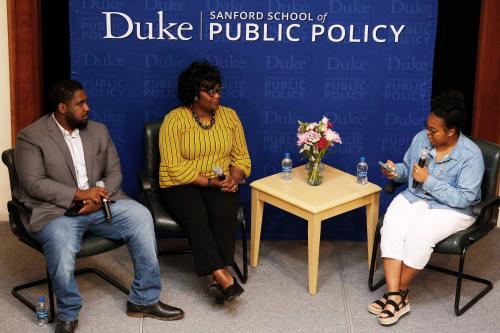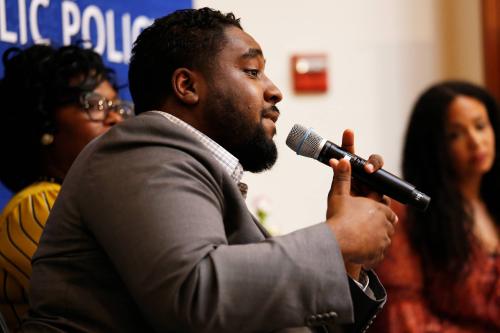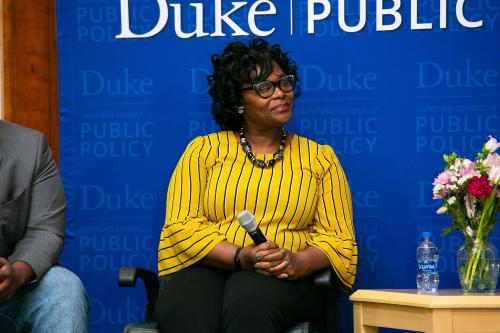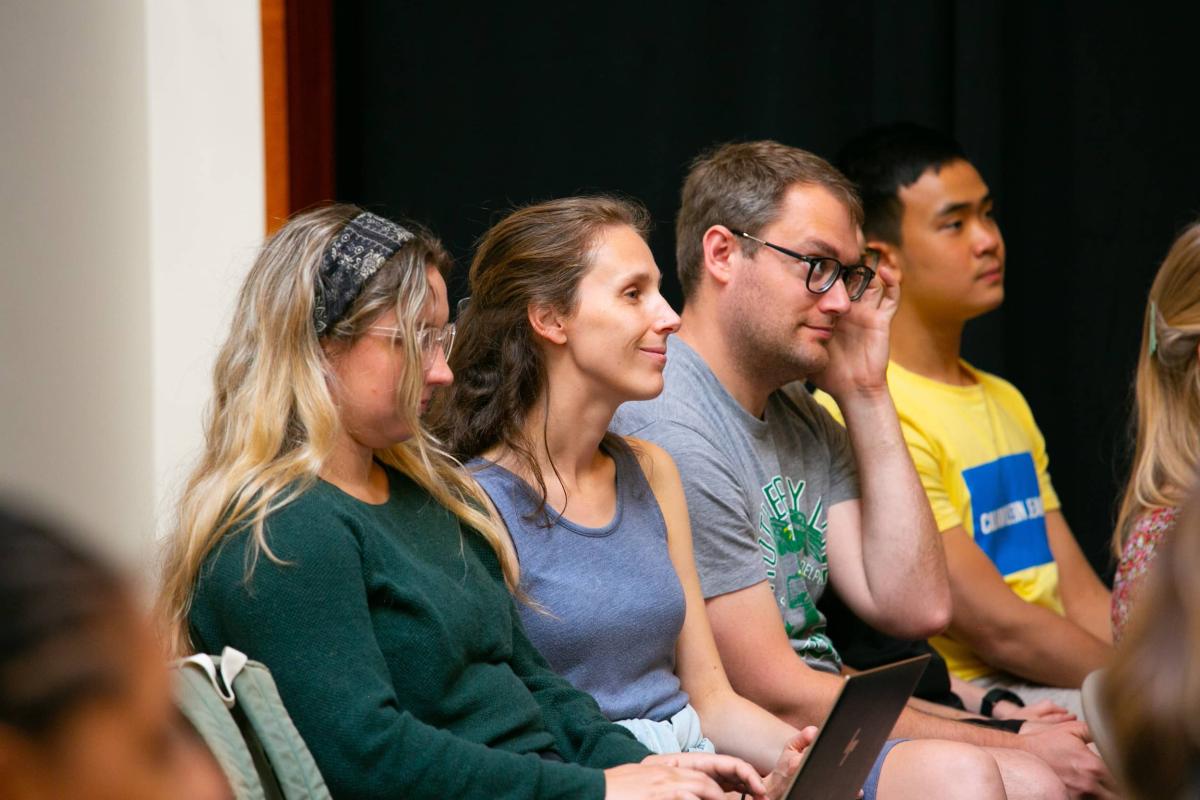Sanford hosted the Spring 2023 Wilson Distinguished Lecture this past week, bringing together three leaders in the field of climate justice and advocacy.
With a rousing introduction that included Prince's "1999" and a spirited call to action to the audience, Raya Salter gave the keynote speech as she recounted her career in climate justice. Salter is an attorney, consultant, educator, and clean energy law and policy expert who specializes in energy and climate justice. She is the founder of the Energy Justice Law and Policy Center and a member of the New York State Climate Action Council. Salter is also an environmental justice advisor to the House Oversight Committee and the House Natural Resources Committee and has testified twice before Congress about environmental justice and big oil misinformation.
In addition, Salter is an adjunct professor of law at Cardozo Law School and has written extensively on energy policy, including a book called "Energy Justice, Domestic and International Perspectives," which was released in 2018.
Salter shared an inspiring message, encouraging the Sanford crowd to "have courage" and to look for "solidarity, equity, and justice" in the search for support for those individuals that are directly impacted by pollution and climate change. With a focus on investing in communities (a theme that would repeat in the panel discussion), Salter highlighted the urgency that climate disasters are already bringing to many. "The future that we fear is actually the present for many", said Salter.
She ended the lecture with several calls to action, invoking a rally-like atmosphere for those gathered. Salter challenged attendees to be "joyful futurists" and to "ask for forgiveness, not permission" as they all "imagine a world that is different" before leading all in a call and response.
"What do we want?" said Salter. "Climate justice!" said the crowd. "When do we want it?" she questioned. "Now!" responded the crowd.
With that call to action in place, the next two climate solution leaders took the stage to discuss climate justice past and present here in North Carolina. Led by Cameron Oglesby ('MPP 23, Climate justice writer) the panel included William J. Barber III, Founder and CEO of the Rural Beacon Initiative, and Angella Dunston, current representative for the League of Conservation Voters for North Carolina's Rural Center. This discussion illuminated the disparities and disillusionment of poor communities in North Carolina, and the plight of those on the front lines of the climate crisis.

Highlights
On the (sometimes) personal history of NC's environmental justice movement

William J. Barber III: I'm from eastern North Carolina and have really been a part of this environmental justice conversation for generations. Justice has always been a part of the energy conversation in this country. In fact, 97 of the 100 counties in the United States that are most impacted by climate change are located in the southeastern United States. I never knew I grew up on the front lines. I just simply knew that the people in those communities had incredible stories of resilience.
Angella Dunston: I grew up in Warren County in the 80s and I always say I cut my teeth on the environmental justice movement. I was protesting alongside my aunts and grandmothers and so many other powerful women in Warren County. For those that don't know, in the 1970s Warren County was chosen as a dumping site for PCBs (polychlorinated biphenyls) and many people came from around Warren County, North Carolina, and from around the country to protest the dumping of this toxic soil. We affectionately take the title of "birthplace of the environmental justice movement in America."
On current priorities in environmental justice in NC

Angella Dunston: There is still a large disparity in health care and education in rural areas that have faced climate disasters. Specifically, in eastern North Carolina and parts of western North Carolina that were faced with hurricane floods over recent decades. I recently visited Lumberton, NC and those people are still feeling the impacts of the floods that happened in 1999. My work is centered around rural North Carolina and how we can help these communities acquire not only the resources but the skills and knowledge to change the effects of what's happening there. The community themselves need to be able to implement the solutions.
William J. Barber III: The reality is that there have been huge gaps in investment going into these frontline communities. There have been gaps in the knowledge curve, where these communities can learn how to show up and take advantage of available resources, and a trust curve where these communities can build relationships with intermediaries and developers to actually deploy projects to help community infrastructure and capital. There is also a huge racial disparity where black and brown people and indigenous people have not been able to take a role in leadership in addressing the issues that they face.
economic development needed for communities that rely on the fossil fuel industry
William J. Barber III: A lot of careers in the fossil fuel industry are destructive not only to the environment but to the workers as well. We need to convince these communities that you should not have to die to make a living. We can create jobs in green energy that are safer and not exploitative of their workers.
best ways to promote policies to help communities nationwide
Angella Dunston: We all have a part to play. From rural Iowa to here in Durham, communities have to be co-partners in their climate solutions. They are not passive. Community inclusion is the key to strategizing for a resilient future.
Featured Video


